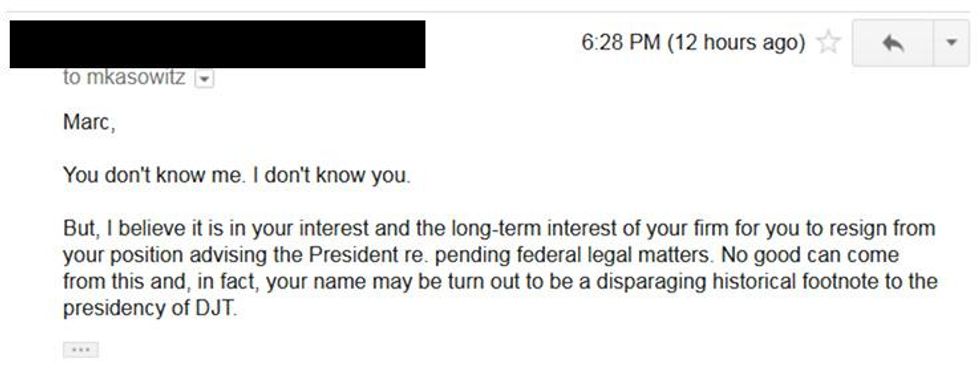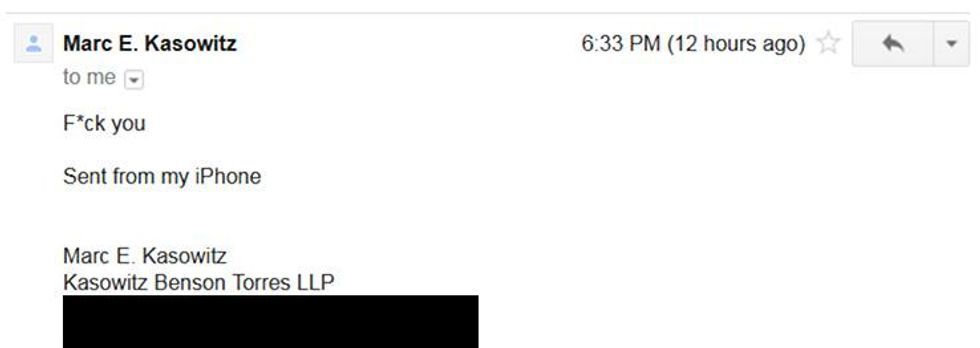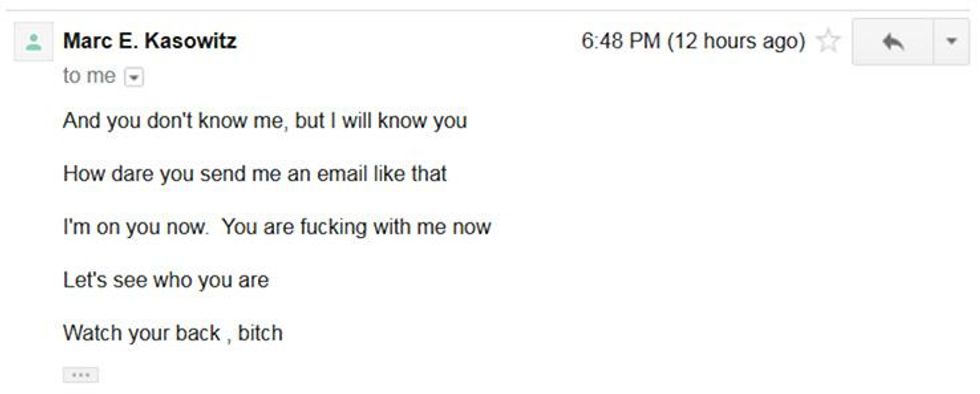

SUBSCRIBE TO OUR FREE NEWSLETTER
Daily news & progressive opinion—funded by the people, not the corporations—delivered straight to your inbox.
5
#000000
#FFFFFF
To donate by check, phone, or other method, see our More Ways to Give page.


Daily news & progressive opinion—funded by the people, not the corporations—delivered straight to your inbox.

WASHINGTON, DC - JUNE 08: Marc Kasowitz, attorney for U.S. President Donald Trump delivers remarks at the National Press Club June 8, 2017 in Washington, DC. Kasowitz delivered remarks in response to former FBI Director James Comey's testimony earlier today before the Senate Intelligence Committee. (Photo by Win McNamee/Getty Images)
Marc Kasowitz, President Trump's personal attorney on the Russia case, threatened a stranger in a string of profanity-laden emails Wednesday night.
The man, a retired public relations professional in the western United States who asked not to be identified, read ProPublica's story this week on Kasowitz and sent the lawyer an email with the subject line: "Resign Now."
Kasowitz replied with series of angry messages sent between 9:30 p.m. and 10 p.m. Eastern time. One read: "I'm on you now. You are fucking with me now Let's see who you are Watch your back , bitch."
In another email, Kasowitz wrote: "Call me. Don't be afraid, you piece of shit. Stand up. If you don't call, you're just afraid." And later: "I already know where you live, I'm on you. You might as well call me. You will see me. I promise. Bro."
Kasowitz's spokesman, Michael Sitrick, said Thursday he couldn't immediately reach Kasowitz for comment.
ProPublica confirmed the man's phone number matched his stated identity. Technical details in the emails, such as IP addresses and names of intermediate mail servers, also show the emails came from Kasowitz's firm. In one email, Kasowitz gave the man a cell phone number that is not widely available. We confirmed Kasowitz uses that number.
The exchange began after the man saw our story featured last night on the Rachel Maddow show on MSNBC. We reported that Kasowitz is not seeking a security clearance even though the Russia case involves a significant amount of classified material.
Experts said Kasowitz could have trouble getting a security clearance because of what multiple sources described as a recent history of alcohol abuse. Former employees also said Kasowitz had engaged in behavior that made them uncomfortable.
Since the story was published, his spokesman issued a statement disputing several parts of the story: "Marc Kasowitz has not struggled with alcoholism," Sitrick wrote. "He has not come into the office intoxicated, attorneys have not had to go across the street to the restaurant during the workday to consult Kasowitz on work matters."
The rigorous background investigation that goes into getting security clearance also considers "any information relevant to strength of character, honesty, discretion, sound judgment, [and] reliability."
The exchange of emails Wednesday began at 9:28 p.m. Eastern when the man sent the following message to Kasowitz's firm account.

Five minutes later, Kasowitz responded with two words:

Fifteen minutes after that, Kasowitz sent a second email:

The man responded politely:

But Kasowitz continued to harangue him:

And then, just 33 minutes after the man's initial email, Kasowitz sent a fourth response, referring to his own Jewish heritage and the man's name, which he presumed to be Jewish.

The man told us that the email exchange disturbed him so greatly he forwarded it to the FBI so there would be a written record in case Kasowitz followed through on the threat.
Experts in the laws on harassment and online threats differed on whether Kasowitz's emails could put him in legal jeopardy.
When considering whether words constitute a true threat versus protected speech, "the threat has to be credible and the person has to intend to make the victim fear imminent physical harm," said Danielle Citron, a University of Maryland law professor and author of a book on online harassment.
Citron pointed in particular to Kasowitz's statements: "I already know where you live" and "you will see me. I promise." She said: "That's incredibly troubling language. If I'm a prosecutor I'm going to think hard about that."
Ron Kuby, a New York lawyer who argued a case that overturned a portion of the state's harassment law on free speech grounds, said he believed Kasowitz had not violated the law with his missives.
"When Kasowitz says things like 'I already know where you live' he is inching closer to the line. But in my view--as someone who despises the Trump administration, but who has litigated these issues--he is well on the legal side of the line."
For over 15 years, Trump has periodically retained Kasowitz, who has cultivated a tough-guy image.
The New York Times reported this week that the relationship between Kasowitz and the Trump White House had soured and that Kasowitz could resign. Kasowitz's spokesman told ProPublica Wednesday: "The NYT story is not accurate." Kasowitz's firm was also sued for malpractice this week by a former client in a billing dispute.
Dear Common Dreams reader, The U.S. is on a fast track to authoritarianism like nothing I've ever seen. Meanwhile, corporate news outlets are utterly capitulating to Trump, twisting their coverage to avoid drawing his ire while lining up to stuff cash in his pockets. That's why I believe that Common Dreams is doing the best and most consequential reporting that we've ever done. Our small but mighty team is a progressive reporting powerhouse, covering the news every day that the corporate media never will. Our mission has always been simple: To inform. To inspire. And to ignite change for the common good. Now here's the key piece that I want all our readers to understand: None of this would be possible without your financial support. That's not just some fundraising cliche. It's the absolute and literal truth. We don't accept corporate advertising and never will. We don't have a paywall because we don't think people should be blocked from critical news based on their ability to pay. Everything we do is funded by the donations of readers like you. Will you donate now to help power the nonprofit, independent reporting of Common Dreams? Thank you for being a vital member of our community. Together, we can keep independent journalism alive when it’s needed most. - Craig Brown, Co-founder |
Marc Kasowitz, President Trump's personal attorney on the Russia case, threatened a stranger in a string of profanity-laden emails Wednesday night.
The man, a retired public relations professional in the western United States who asked not to be identified, read ProPublica's story this week on Kasowitz and sent the lawyer an email with the subject line: "Resign Now."
Kasowitz replied with series of angry messages sent between 9:30 p.m. and 10 p.m. Eastern time. One read: "I'm on you now. You are fucking with me now Let's see who you are Watch your back , bitch."
In another email, Kasowitz wrote: "Call me. Don't be afraid, you piece of shit. Stand up. If you don't call, you're just afraid." And later: "I already know where you live, I'm on you. You might as well call me. You will see me. I promise. Bro."
Kasowitz's spokesman, Michael Sitrick, said Thursday he couldn't immediately reach Kasowitz for comment.
ProPublica confirmed the man's phone number matched his stated identity. Technical details in the emails, such as IP addresses and names of intermediate mail servers, also show the emails came from Kasowitz's firm. In one email, Kasowitz gave the man a cell phone number that is not widely available. We confirmed Kasowitz uses that number.
The exchange began after the man saw our story featured last night on the Rachel Maddow show on MSNBC. We reported that Kasowitz is not seeking a security clearance even though the Russia case involves a significant amount of classified material.
Experts said Kasowitz could have trouble getting a security clearance because of what multiple sources described as a recent history of alcohol abuse. Former employees also said Kasowitz had engaged in behavior that made them uncomfortable.
Since the story was published, his spokesman issued a statement disputing several parts of the story: "Marc Kasowitz has not struggled with alcoholism," Sitrick wrote. "He has not come into the office intoxicated, attorneys have not had to go across the street to the restaurant during the workday to consult Kasowitz on work matters."
The rigorous background investigation that goes into getting security clearance also considers "any information relevant to strength of character, honesty, discretion, sound judgment, [and] reliability."
The exchange of emails Wednesday began at 9:28 p.m. Eastern when the man sent the following message to Kasowitz's firm account.

Five minutes later, Kasowitz responded with two words:

Fifteen minutes after that, Kasowitz sent a second email:

The man responded politely:

But Kasowitz continued to harangue him:

And then, just 33 minutes after the man's initial email, Kasowitz sent a fourth response, referring to his own Jewish heritage and the man's name, which he presumed to be Jewish.

The man told us that the email exchange disturbed him so greatly he forwarded it to the FBI so there would be a written record in case Kasowitz followed through on the threat.
Experts in the laws on harassment and online threats differed on whether Kasowitz's emails could put him in legal jeopardy.
When considering whether words constitute a true threat versus protected speech, "the threat has to be credible and the person has to intend to make the victim fear imminent physical harm," said Danielle Citron, a University of Maryland law professor and author of a book on online harassment.
Citron pointed in particular to Kasowitz's statements: "I already know where you live" and "you will see me. I promise." She said: "That's incredibly troubling language. If I'm a prosecutor I'm going to think hard about that."
Ron Kuby, a New York lawyer who argued a case that overturned a portion of the state's harassment law on free speech grounds, said he believed Kasowitz had not violated the law with his missives.
"When Kasowitz says things like 'I already know where you live' he is inching closer to the line. But in my view--as someone who despises the Trump administration, but who has litigated these issues--he is well on the legal side of the line."
For over 15 years, Trump has periodically retained Kasowitz, who has cultivated a tough-guy image.
The New York Times reported this week that the relationship between Kasowitz and the Trump White House had soured and that Kasowitz could resign. Kasowitz's spokesman told ProPublica Wednesday: "The NYT story is not accurate." Kasowitz's firm was also sued for malpractice this week by a former client in a billing dispute.
Marc Kasowitz, President Trump's personal attorney on the Russia case, threatened a stranger in a string of profanity-laden emails Wednesday night.
The man, a retired public relations professional in the western United States who asked not to be identified, read ProPublica's story this week on Kasowitz and sent the lawyer an email with the subject line: "Resign Now."
Kasowitz replied with series of angry messages sent between 9:30 p.m. and 10 p.m. Eastern time. One read: "I'm on you now. You are fucking with me now Let's see who you are Watch your back , bitch."
In another email, Kasowitz wrote: "Call me. Don't be afraid, you piece of shit. Stand up. If you don't call, you're just afraid." And later: "I already know where you live, I'm on you. You might as well call me. You will see me. I promise. Bro."
Kasowitz's spokesman, Michael Sitrick, said Thursday he couldn't immediately reach Kasowitz for comment.
ProPublica confirmed the man's phone number matched his stated identity. Technical details in the emails, such as IP addresses and names of intermediate mail servers, also show the emails came from Kasowitz's firm. In one email, Kasowitz gave the man a cell phone number that is not widely available. We confirmed Kasowitz uses that number.
The exchange began after the man saw our story featured last night on the Rachel Maddow show on MSNBC. We reported that Kasowitz is not seeking a security clearance even though the Russia case involves a significant amount of classified material.
Experts said Kasowitz could have trouble getting a security clearance because of what multiple sources described as a recent history of alcohol abuse. Former employees also said Kasowitz had engaged in behavior that made them uncomfortable.
Since the story was published, his spokesman issued a statement disputing several parts of the story: "Marc Kasowitz has not struggled with alcoholism," Sitrick wrote. "He has not come into the office intoxicated, attorneys have not had to go across the street to the restaurant during the workday to consult Kasowitz on work matters."
The rigorous background investigation that goes into getting security clearance also considers "any information relevant to strength of character, honesty, discretion, sound judgment, [and] reliability."
The exchange of emails Wednesday began at 9:28 p.m. Eastern when the man sent the following message to Kasowitz's firm account.

Five minutes later, Kasowitz responded with two words:

Fifteen minutes after that, Kasowitz sent a second email:

The man responded politely:

But Kasowitz continued to harangue him:

And then, just 33 minutes after the man's initial email, Kasowitz sent a fourth response, referring to his own Jewish heritage and the man's name, which he presumed to be Jewish.

The man told us that the email exchange disturbed him so greatly he forwarded it to the FBI so there would be a written record in case Kasowitz followed through on the threat.
Experts in the laws on harassment and online threats differed on whether Kasowitz's emails could put him in legal jeopardy.
When considering whether words constitute a true threat versus protected speech, "the threat has to be credible and the person has to intend to make the victim fear imminent physical harm," said Danielle Citron, a University of Maryland law professor and author of a book on online harassment.
Citron pointed in particular to Kasowitz's statements: "I already know where you live" and "you will see me. I promise." She said: "That's incredibly troubling language. If I'm a prosecutor I'm going to think hard about that."
Ron Kuby, a New York lawyer who argued a case that overturned a portion of the state's harassment law on free speech grounds, said he believed Kasowitz had not violated the law with his missives.
"When Kasowitz says things like 'I already know where you live' he is inching closer to the line. But in my view--as someone who despises the Trump administration, but who has litigated these issues--he is well on the legal side of the line."
For over 15 years, Trump has periodically retained Kasowitz, who has cultivated a tough-guy image.
The New York Times reported this week that the relationship between Kasowitz and the Trump White House had soured and that Kasowitz could resign. Kasowitz's spokesman told ProPublica Wednesday: "The NYT story is not accurate." Kasowitz's firm was also sued for malpractice this week by a former client in a billing dispute.